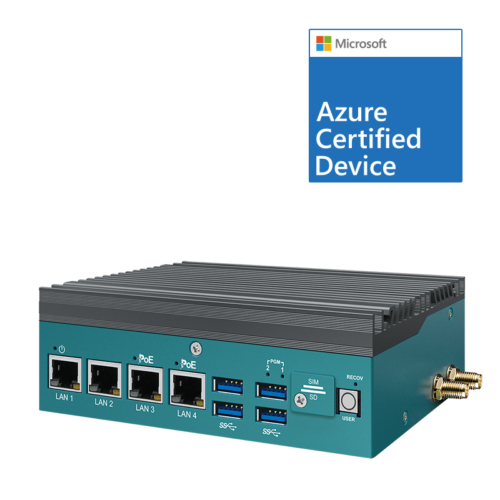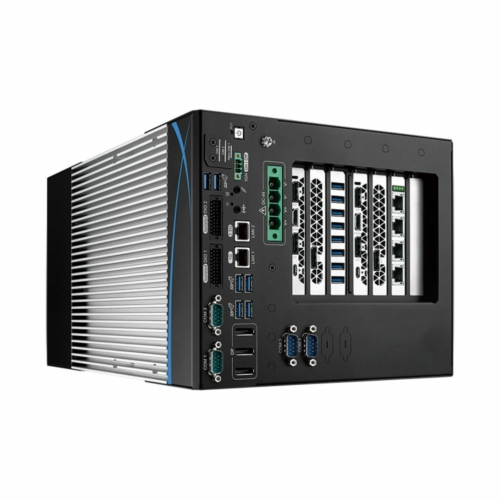Industrial GPU Computers Command Edge AI Inference Systems for Automated Food Factory
Can artificial intelligence (AI) cook and prepare the food we eat every day? Well, you may be surprised to learn that advancements in AI GPU computing and machine vision technology allows autonomous preparation and cooking of the food we eat today in specialized smart factories.
Industrial AI Computing for Machine Vision

EAC-2100
Rugged NVIDIA Jetson Xavier NX GMSL Automotive Computer with PoE+

RCX-2750R PEG
11th Gen Rocket Lake Industrial GPU Computer
Adapting from Human Intervention to Complete Automation
We are pleased to offer you in this article, the feedback of a muffin manufacturing plant. AI helps ensure that each product is of consistent quality, always perfectly cooked before being packaged and shipped. To ensure perfect cooking, it is necessary to maintain a constant temperature in the ovens 24 hours a day, 7 days a week, which is a challenge, especially when it comes to cooking in batches, different types of muffins. Currently, the plant uses visual inspection, whereby employees check cooking levels and adjust oven temperatures based on their skills and experience.
However, the staff experience is not always 100% consistent and each person has their own subjective judgment. On the contrary, the AI behaves in a non-emotional way and each robot inspects each muffin objectively and automatically controls the oven temperatures. Due to the constant increase in the scale of production, the factory can no longer rely on human intelligence to meet consumer demand. But with AI, production is optimized and new types of products can be developed based on customer market research. So, for example, a new range of healthier products can be rapidly developed and AI can easily adapt production to demand.
Developing an AI Quality Control System
To build an AI-driven quality control system for the production line, AI models had to be prepared before deployment. An AI model training server has been configured to capture video and collect image datasets from production lines. Meanwhile, AI models have been generated based on carefully designed neural networks and AI learning servers have harnessed the processing power of graphics data processing processors (GPUs) and industrial PC (CPU) processors to manage all peripheral AI systems. These AI models were deployed to the inference systems via the model management software on the training server and on-site training was needed to improve accuracy on the actual production line.
AI inference systems on the production line had to be designed fanless to withstand damage from flour and dust in the environment. A reduced form factor was another feature needed to integrate the new state-of-the-art AI system into existing equipment. The deployment of AI was essential as the muffin production lines had to be running at full capacity and could not be delayed during the inspection. The edge AI systems required multiple I/O interfaces to capture video images from the cameras and transmit the metadata to central management.
Training AI Models with 11th Gen Intel Processing, RTX3090 GPUs and 2.5GbE High Speed Data Transfer Rates
To collect such a large data set and train different AI models, the factory integrated RCX-2750R PEG industrial GPU computers from Vecow with an RTX graphics card to make it a powerful training server. The ruggedized GPU server has the ability to collect data from on-board systems, pre-process images before labelling datasets, and generate AI models for the production line. As soon as new data arrives, the process can quickly retrain the models to increase accuracy.
Deploying Trained AI Models on NVIDIA Jetson Xavier NX at the Edge. Supercomputer Performance in a Compact Form Factor with Rugged Reliability
To maintain cooking homogeneity, the EAC-2100 inference system also manufactured by Vecow has been integrated with a variety of AI models that perform real-time inspection to ensure that all muffins are perfectly baked. This state-of-the-art AI system was also capable of capturing video/image data from cameras installed throughout the area, automatically inspecting cooking quality, and classifying it into OK and NG categories. Category NG muffins were flagged and displayed on the display monitor for inspectors. Oven temperatures are adjusted if necessary. NG product images and log data were also recorded and sent to the management system for evaluation. The plant now benefits from much better efficiency and more consistent production of quality muffins thanks to its state-of-the-art AI system.
Looking to Deploy GPU Computers in Your Factory?
Arrange a call to discuss your vision automation requirements.
